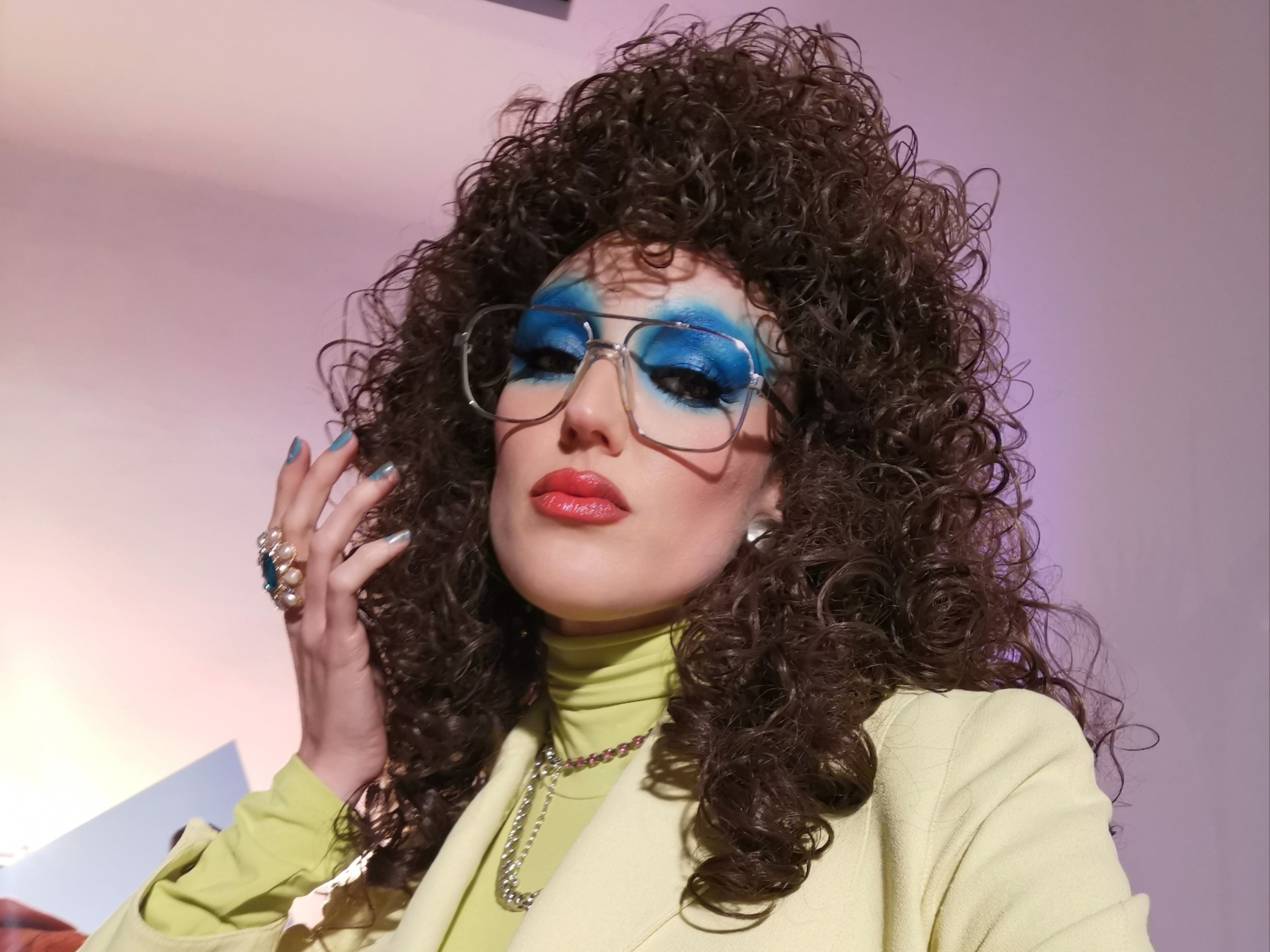‘There is a demographic of gay men that think I should shut up and sit down’: Meet the female drag queens
As Drag Race welcomes its first ever cis woman queen to the competition, Joanna Whitehead speaks to some of the UK’s other female queens about their experiences of the sequin-strewn world of drag


TeTe Bang was 19 years old when she first moved to London from her rural hometown. “I wanted to make friends and I liked dressing up, so I started going out to queer spaces,” she tells The Independent. TeTe found a queer community and joined them, dressing up in spandex, feathers and sparkle to DJ, dance and entertain crowds across the capital. But it wasn’t until other people started to label it that she realised what she was doing was drag. “I was like, ‘oh, okay - that’s what this is, I guess’,” she says.
Now 30, TeTe has been a drag queen for eight years and has seen success across the UK and beyond, joining the Glitterbox Ibiza family and drag collective The Family Gorgeous as part of Channel 4’s Drag SOS series, which helps “unlikely proteges unlock their long-lost confidence”. But the challenge of being female in the traditionally male space of drag remains.
“Cis women doing drag have to up our game constantly,” she says. “We can’t be lazy with our drag – we can’t just throw on a Primark dress and a wig because people call us out for it more than they would a cis man doing the same.”

The discussion of cisgender women performing as drag queens has returned to social media recently as hit TV franchise RuPaul’s Drag Race UK welcomed its first female cisgender competitor, Victoria Scone, when it began its third UK season earlier this month. The reality show, which first premiered in the US in 2009, sees around a dozen drag queens assessed by head judge and drag veteran RuPaul Charles and a selection of celebrity judges, on their charisma, uniqueness, nerve and talent. Queens each have their own area of expertise – from dressmaking to singing – with contestants marked on their dancing, design, comedy and performance skills.
The franchise has spawned 13 US seasons, six spin-off seasons called All-Stars and six international versions of the show – and there’s even an annual RuPaul’s Drag Con in Los Angeles, New York and London to celebrate all things drag. It has won countless awards and brought drag to mainstream audiences, with season one of RuPaul’s Drag Race UK attracting a whopping 12 million viewers for BBC Three. But until now, the franchise has yet to welcome a cisgender woman.
I genuinely think I was born to be a drag queen. But I didn’t really know if, as a woman, that was a possibility for me
Drag has a long and storied history that dates back to Shakespearean times. With theatrical performances closely linked to and monitored by the church, only men were historically permitted to tread the boards, prompting them to adopt female roles.
The art form has moved on since then, developing through Victorian musical halls, pantomime and into club and pub culture. Across the pond, drag draws inspiration from “ball culture”, an underground subculture largely dominated by LGBTQ+ people of colour that saw people dress up and perform for prizes in 1980s New York.
Largely (but not exclusively) performed by people who identify as LGBTQ+, it remains a source of escape, expression and entertainment for queer people. Despite its evolution, which incorporates drag kings (women dressing as men) and non-binary and trans performers, drag continues to be undeniably associated with men dressing up as women, making Victoria Scone’s addition to the Drag Race UK line-up a turning point for the art form.

The announcement that Drag Race would be welcoming its first ever cisgender female queen ruffled the feathers of some drag devotees and viewers of the show, however. While most fans of the show have been supportive of her inclusion, others have questioned her participation in the competition, despite her being a lesbian who has been performing in drag for three years. Cisgender women who perform drag are often referred to as AFAB (Assigned Female At Birth) or “bio” queens, a reference to the gender they were assigned at birth but, for many queens, the contents of a person’s pants should remain secondary to the show.
“I genuinely think I was born to be a drag queen. But I didn’t really know if, as a woman, that was a possibility for me,” Victoria said in a recent interview. In response to reactions to the new season trailer, she told The Independent: “I know it seems that the negative [comments are] so horrific, but I can’t take it personally because they are misogynists. If your only reason for not enjoying me when you’ve only seen a 90-second clip of me is that I’m not a ‘real’ drag queen, I can’t take that personally. That’s just because you have a problem with a woman doing drag.”
There is a history of drag queens making fun of women and femininity, and not in a way that comes from a place of love or appreciation or understanding, and that definitely still exists
Despite the backlash against female drag queens, TeTe believes that her experiences as a woman give her an edge over traditional male drag queens. “I do think that our stories come from a more informed perspective. At one point, drag was about celebrating women and being inspired by them and making fun of the patriarchy. Cis women doing drag have the best insights into what that experience is like and can produce the most interesting and authentic work.”
Apple Derrieres has been running drag king night BOiBox with her wife, who performs as drag king Adam All, for eight years. She sees performing as Apple as a “huge part of her life” that “allows [her] to celebrate [her] own femininity and queerness.” Apple says that people often don’t know she’s a woman when she’s performing, “which is excellent because that's the point - why should it matter?”
Despite rainbow slogans and messages of acceptance and inclusivity, misogyny mars LGBTQ+ life in much the same way as it does within the straight world. TeTe says: “The day-to-day misogyny is constant, mainly from gay men. There is definitely a demographic of gay men that think I should shut up and sit down. There is a history of drag queens making fun of women and femininity, and not in a way that comes from a place of love or appreciation or understanding, and that definitely still exists.”

Apple echos this sentiment. “AFAB queens do enter with a bar of expectations set; we have to skate uphill and be big and bold and brilliant,” she says. “There is no room for error because we often enter to raised brows and folded arms before the show has even started.”
Her performances are dominated by lesbian anthems and musical numbers celebrating femininity and menstruation. “As AFAB bodies and lesbians continue to be ridiculed in drag, I like to punch back at that with humour, jazz hands and a singsong but I'm serious in my intention. We need to normalise and celebrate AFAB bodies. Men in the room who insist on clinging to vagina and lesbian jokes screw up their faces but I just sing louder... in their direction.”
Fancy Shews!, a 33-year-old drag queen based in London, has put safeguards in place to counter this. “I have experienced misogyny in many ways, but that’s exactly why I have an agent and I’m signed up with Equity [trade union for the performing arts]. I have protection in place to safeguard me. I find that there’s a certain bunch of gay dudes who are just not ready to experience women and have a really hateful thing going on. It’s weird.”
Doing drag gives me confidence in my day-to-day life; it’s like another facet of me as a person
Despite their negative experiences, all three women believe that the drag community has brought more good than bad into their lives, instilling them with confidence, surrounding them with a likeminded collective of friends and enabling them to be truly themselves.
“Doing drag gives me confidence in my day-to-day life; it’s like another facet of me as a person,” says Fancy Shews!. “Before, I never really spoke up for myself and now I’m more confident to do so. When I started performing, I also met people who suddenly ‘got’ me and got my queerness. It’s really special and something so valuable.”
For TeTe, validating her experience has been life-changing. “I’ve been able to share some of my experiences as a queer person and hearing from other people that they appreciate those stories and relate to them is really valuable.”
Apple says she loves being able to inspire people. “Empowering others, especially young queer AFAB people, to take pride in themselves and their bodies, whether that be on stage or in their everyday lives, is amazing.”
Ultimately, says Fancy Shews!, when it comes to Drag Race UK, the focus should remain on the performance. “I think Victoria Scone is very good and that’s ultimately what performance is about at that level. You have to be very good – it doesn’t matter whether you’re a man or a woman or whatever. She absolutely deserves a place there.”
Apple agrees but warns against resting on our laurels. “Victoria Scone is a brilliant drag queen. She is a talented person who can dance, sing and she creates incredible looks. It just shouldn’t have taken so long for this door to open but it’s a very positive moment – a moment that we’ve waited for – but there is still further to go.”
Join our commenting forum
Join thought-provoking conversations, follow other Independent readers and see their replies
Comments
Bookmark popover
Removed from bookmarks